Honduras elections: Security key issue as Hernández runs again
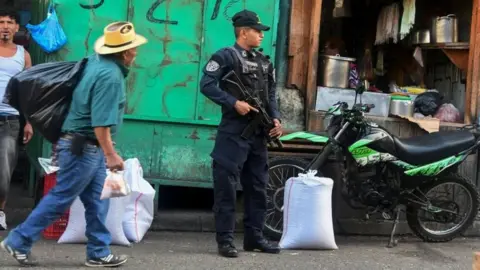 AFP
AFPPresident Juan Orlando Hernández has governed Honduras since January 2014 and hopes that on Sunday voters will re-elect him for another four-year term.
An incumbent running for re-election would not raise eyebrows in most other countries but it has caused consternation among some in Honduras.
That is because until recently, the Honduras constitution limited presidents to a single term in office.
But in 2015, the country's supreme court lifted the ban on presidents serving a second term.
Controversial race for re-election
The decision proved controversial, with many in the opposition saying the supreme court did not have the power to overturn an article of the constitution.
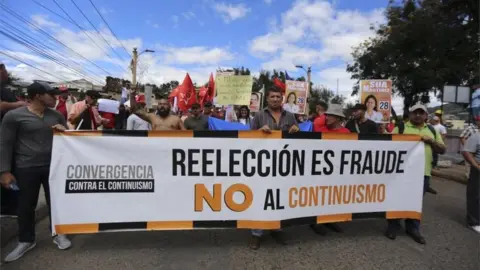 EPA
EPAIt particularly rankled with the supporters of Manuel Zelaya, the former president who was forced into exile by the military in 2009 after he proposed holding a referendum on whether to scrap the ban on presidents running a second time.
Critics of President Hernández said it was unfair that he should "get away" with changing the constitution when the sheer proposal of a vote on the issue had cost Mr Zelaya his job just a few years earlier.
Despite vociferous protests, Mr Hernández said he planned to seek re-election and in March his National Party chose him as their candidate in the party's primary.
Opinion polls gathered earlier this year suggested he was the frontrunner despite the controversy about his candidacy not abating.
Eight other candidates are standing against President Hernández.
His main rivals are Salvador Nasralla of the Opposition Alliance and former university rector Luis Zelaya of the Liberal Party.
Six more candidates are also in the running but have fared badly in pre-election opinion polls.
It is the largest number of candidates to ever run for the presidency in Honduras, where the winner is decided in a single round.
US-friendly candidate
Juan Orlando Hernández, 49, has been campaigning on a promise to attract investment to the Central American nation and continue his crackdown on violent gangs.
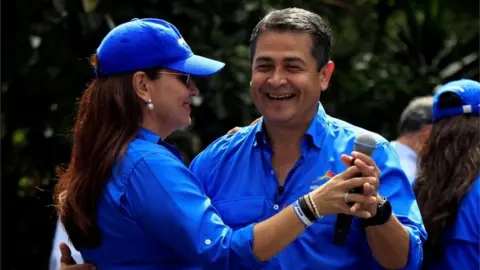 Reuters
ReutersThe 15th of 17 children, President Hernández made the fight against gangs one of the main priorities of his first term in office.
Last year, he sent jailed gang leaders to newly built maximum security prisons as part of a wider plan to regain control of the jails from inmates.
As part of the plan, high-risk prisoners were transferred to isolation cells with no right to visits, phone calls and only one hour a day outside.
Mr Hernández has also promised to drive down unemployment to reduce the number of Hondurans emigrating to the US.
President Hernández has had a good relationship with both the Obama and the Trump administrations in the United States.
Under his presidency, Honduras and fellow Central American nations Guatemala and El Salvador have joined in the Alliance for Prosperity, which has received considerable funds from the US.
Sports journalist turned politician
TV presenter and sports journalist Salvador Nasralla, 64, has been campaigning on an anti-corruption ticket.
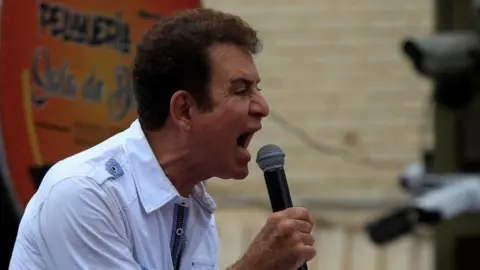 Reuters
ReutersMr Nasralla, whose parents are of Lebanese descent, has railed against the traditional parties in Honduras and became a founding member of the anti-corruption party in 2013.
He is standing for a coalition of opposition parties which includes socialists, social democrats and centrists who have joined forces to defeat the monopoly on power of the Nationalist Party of President Hernández and the Liberal Party of Luis Zelaya.
Speaking at the closing event of his campaign, Mr Nasralla said he would work for the country's farm and factory workers, promising to create 600,000 jobs in the agricultural sector and in factories.
Mr Nasralla also has good contacts in the business sector, having worked as the CEO of Pepsi in Honduras.
'More inclusive'
Luis Zelaya, 50, has been a top figure in the Liberal Party for decades.
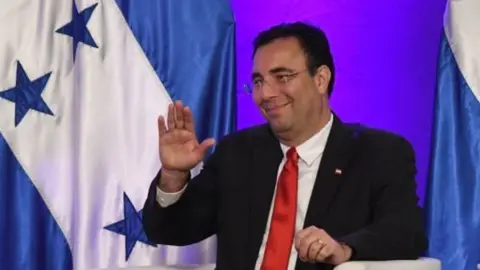 AFP
AFPHis main campaign promise has also been to increase security in Honduras, which has one of the highest murder rates in the world.
He says that if he wins, he will strengthen the police and the prosecutor's office. He also wants to purge the security forces from any corrupt officers and create a community-based police force.
Mr Zelaya said he would also ensure that economic growth in Honduras did not just benefit the few but the many.
He vowed to turn his attention in particular to the elderly, the young and the women of Honduras.
The six million-plus eligible voters in Honduras will also be asked to cast their votes for three vice-presidents, all 128 members of parliament and almost 300 mayors.
